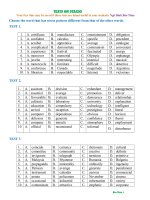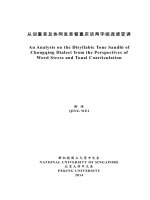WORD STRESS
Bạn đang xem bản rút gọn của tài liệu. Xem và tải ngay bản đầy đủ của tài liệu tại đây (187.57 KB, 8 trang )
Word Stress
English words have certain patterns of stress which you should observe
strictly if you want to be understood. The best way to learn English
stress is to listen to audio materials and to repeat them after the
speaker.
The
links
on
the
entrance
pages
of
the
sections Phonetics, Phrases, and Vocabulary lead to the sites that offer
useful listening materials, including sounds, syllables, words,
sentences, and conversations. An overview of typical English patterns
of word stress in this material will help you to recognize and understand
word stress when you work with listening materials. It will also be
helpful to listen to examples of word stress in Listening for Word Stress
(AmE) in the section Phonetics.
Note: Main stressed syllable in the word is indicated by capital letters
in this material, for example, LEMon. In words with two stresses,
capital letters with a stress mark before them show the syllable with
primary stress, and small letters with a stress mark before them show
the syllable with secondary stress, for example, 'eco'NOMics.
General guidelines on word stress
Generally, common English nouns, adjectives, and adverbs are more
often stressed on the first syllable than on any other syllable. Verbs
with prefixes are usually stressed on the second syllable, i.e., on the
first syllable of the root after the prefix. English words can't have two
unstressed syllables at the beginning of the word; one of these
syllables will be stressed. If a word has four or more syllables, there
are usually two stresses in it: primary stress (strong stress) and
secondary stress (weak stress). Also, secondary stress may be present
(in addition to primary stress) in shorter words in the syllable in which
the vowel sound remains long and strong.
Prefixes are often stressed in nouns and less often in verbs. Suffixes at
the end of the word are rarely stressed, except for a few noun,
adjective, and verb suffixes that are usually stressed: rooMETTE,
'ciga'RETTE / 'CIGa'rette, Chi'NESE, 'SIGni'fy, 'ORga'nize, 'DECo'rate.
In longer derivative words, stress may fall on a suffix or prefix
according to typical patterns of word stress. Endings are not stressed.
Stress in derivatives
Stress in a derivative may remain the same as in the word from which
it was derived, or it may change in a certain way. When nouns are
formed from verbs, or verbs are formed from nouns, the following
patterns of stress often occur.
The same stress:
deNY (verb) – deNIal (noun)
ofFEND (verb) – ofFENCE (noun)
reVIEW (noun) – reVIEW (verb)
PREview (noun) – PREview (verb)
HOSpital (noun) – HOSpitalize (verb)
Shift of stress:
preSENT (verb) – PRESent (noun)
reFER (verb) – REFerence (noun)
exTRACT (verb) – EXtract (noun)
inCREASE (verb) – INcrease (noun)
OBject (noun) – obJECT (verb)
Other parts of speech derived from nouns and verbs have the following
typical patterns of stress.
Adjectives are usually stressed on the first syllable or repeat the stress
of the nouns from which they were derived: fate (noun) – FATal (adj.);
COLor (noun) – COLorful (adj.). But stress may change in longer
derivative adjectives: METal (noun) – meTALlic (adj.); ATHlete (noun)
– athLETic (adj.); geOLogy (noun) – 'geo'LOGical (adj.); ARgument
(noun) – 'argu'MENtative (adj.).
Adverbs are usually stressed on the first syllable or repeat the stress
of the adjectives from which they were derived: ANgry – ANgrily;
WONderful – WONderfully; FOOLish – FOOLishly; athLETic –
athLETically.
Gerunds and participles repeat the stress of the verbs from which they
were formed: forGET – forGETting – forGOTten; CANcel – CANceling –
CANceled; 'ORga'nize – 'ORga'nizing – ORganized.
Typical patterns of stress
Let's look at typical examples of stress in English words. Main factors
that influence stress are the number of syllables in the word, and
whether the word is a noun, an adjective, or a verb.
ONE-SYLLABLE WORDS
One-syllable nouns, verbs, adjectives, and adverbs are stressed on the
vowel sound in the word. Note that a diphthong is one complex vowel
sound that forms only one syllable. A diphthong is stressed on its first
main component.
book, cat, rain, boat, crow, chair
read, burn, touch, choose, laugh, hear
new, bright, large, short, clear, loud
late, fast, soon, now
TWO-SYLLABLE WORDS
Two-syllable nouns
Two-syllable nouns are usually stressed on the first syllable.
TEACHer, STUDent, CARpet, LESson
REgion, ILLness, STATEment, CITy
CONvict, INcrease, INstinct, OBject
PERmit, PRESent, PROject, SYMbol
Nouns may be stressed on the last syllable if there is a long vowel
sound or a diphthong in it. Words of foreign origin (especially words of
French origin) may be stressed on the last syllable.
trainEE, caREER, deLAY, conCERN
poLICE, hoTEL, beRET, rooMETTE
Two-syllable adjectives
Two-syllable adjectives are usually stressed on the first syllable.
FUNny, LOCal, USEful
FOOLish, NATive, CAREless
Some adjectives are stressed on the last syllable if there is a long vowel
sound or a diphthong in it.
abSURD, comPLETE, exTREME, moROSE
If there is a prefix in an adjective, stress often falls on the first syllable
of the root after the prefix.
inSANE, imMUNE, enGAged
unWELL, unKNOWN
Two-syllable verbs
Two-syllable verbs are usually stressed on the second syllable,
especially if the first syllable is a prefix.
adMIT, apPLY, beGIN, beLIEVE
comBINE, conFIRM, deNY, deSERVE
disLIKE, misPLACE, exPLAIN
forBID, forGET, igNORE, inVITE
oBEY, ocCUR, perMIT, prePARE
proPOSE, purSUE, reCEIVE, rePLY
supPLY, surPRISE, unDO, unLOCK
But there are many verbs that are stressed on the first syllable.
HAPpen, CANcel, PRACtice
ANswer, OFfer, MENtion
FOLlow, BORrow, PUNish
THREE-SYLLABLE WORDS
Three-syllable nouns
Three-syllable nouns are usually stressed on the first syllable.
POLitics, GOVernment, GENeral
INterest, GRADuate, CONfidence
But many nouns, especially those derived from verbs with prefixes,
have stress on the second syllable.
apPROVal, conFUSion, conSUMer
corRECTness, eLECtion, diRECtor
Some nouns have primary stress on the last syllable if there is a long
vowel sound or a diphthong in it.
'engi'NEER, 'refu'GEE
Three-syllable adjectives
Three-syllable adjectives are usually stressed on the first syllable.
GENeral, DELicate, EXcellent
WONderful, FAVorite, CURious
Some adjectives have one more stress on the last syllable if there is a
long vowel or a diphthong in it.
'OBso'lete / 'obso'LETE
'Vietna'MESE, 'Portu'GUESE
Some adjectives do not repeat the stress of the noun from which they
were derived and are stressed on the second syllable.
geNERic, symBOLic, inSTINCtive
Three-syllable verbs
Three-syllable verbs often have primary stress on the first syllable
(even if it is a prefix) and secondary stress on the last syllable (which
is often a verb suffix).
'ORga'nize, 'MODer'nize
'SIGni'fy, 'SPECi'fy
'COMpen'sate, 'DECo'rate
'COMpli'ment, 'CONsti'tute
But many verbs, especially those with prefixes, have stress on the
second syllable.
conTINue, conSIDer, reMEMber
If the prefix consists of two syllables, its first syllable usually gets
secondary stress.
'under'STAND, 'decom'POSE
'contra'DICT, 'corre'SPOND
FOUR OR MORE SYLLABLES
Long nouns, adjectives, verbs, and adverbs usually have two stresses:
primary stress and secondary stress. But there are some long words
with only one stress. There are four patterns of stress in long words.
Only one stress: on the first syllable
Nouns:
ACcuracy, DELicacy
Adjectives:
INteresting
Only one stress: on the second syllable
Nouns:
inTOLerance, geOMetry, aMERica
simPLICity, moBILity, teLEpathy
acCOMpaniment
Adjectives:
sigNIFicant, mysTErious, traDItional
inTOLerable, unREAsonable, noTOrious
Verbs:
acCOMpany
Two stresses: on the first and third syllable
This is a very common stress pattern in long words in English.
Nouns:
'eco'NOMics, 'infor'MAtion
'consti'TUtion, 'repe'TItion
'coloni'ZAtion, 'multipli'CAtion
Adjectives:
'aca'DEMic, 'geo'METrical
'inter'NAtional, 'cosmo'POLitan
'capita'LIStic, 'conver'SAtional
'PAtro'nizing
Two stresses: on the second and fourth syllable
Nouns:
con'side'RAtion
in'vesti'GAtion
con'tinu'Ation
Adjectives:
ex'peri'MENtal
in'compre'HENsible
Verbs:
i'DENti'fy, in'TENsi'fy
in'TOXi'cate, ac'CUmu'late
com'MERcia'lize, a'POLo'gize.









